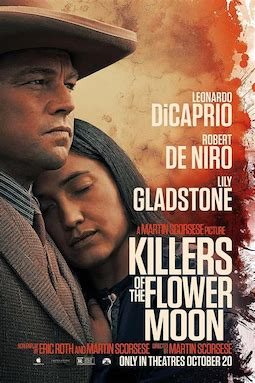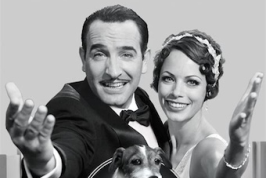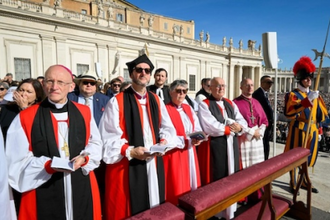Film: Killers of the Flower Moon

By 1918, when this epic film directed by Martin Scorsese opens, Native Americans were something of a lost minority in their own land - in reservations, or wandering from place to place in the Oklahoma Badlands, as is with the Osage Nation here. In silent film style, their situation is dramatised, poverty and on the move, the sudden gushers of oil on Osage Land, unexpected wealth and affluent lifestyle, befriended by Whites, patronised by Whites, and the targets for intermarriage and inheriting land and oil rights. It is not yet 40 years since Cochise and Custer's Last Stand at Little Big Horn.
There is also a preface to the film where Osage Elders gather, talk about their traditions, and regrets that the next generation is being taught by white teachers, their learning other ways and forgetting their own.
Into this world comes Ernest (Leonardo DiCaprio), returning from being a cook on the French battlefields. Not the smartest, he is welcomed by his highly reputed uncle, King (Robert De Niro), and his brother Byron (Scott Shepherd). King seems to be benignity personified, promoting the welfare of everyone in the town of Fairfax, whatever their origins. Ernest runs a taxi, and is eager to drive Mollie (a dignified and quietly passionate Lily Gladstone) to her mother's house. She has several sisters, who are involved with white men. And then the visual information that many Osage die. King encourages Ernest's interest in Mollie for marriage, children and inheritance reasons and, while Ernest continually smiles and gloats that he loves money, he does fall in love with Mollie.
Martin Scorsese has made films for over 50 years, so many of them about American crime, especially gangsters. This time, he takes up the cause of the Native Americans, and their being victimised by criminal greed and violence.
This is a very long film: three and a half hours. Like Oppenheimer, it presents itself in three parts. The first part introduces the characters and issues, immerses the audience in the life of the town, part frontier, part stable, and the interaction between white and Native American. Once this is established, the second part focuses on the characters, the events, the violence, the exploitation, King, continually smiling, yet a Machiavellian influence, Bible quoting, especially on Ernest for whom greed and loyalty to King affect his love for his wife, who is suffering from diabetes, the beginnings of the availability of insulin. The third part, like the third part of Oppenheimer, might seem something of anti-climax to those very much involved in the action. The third part is the legal part, the arrival of FBI agents, investigations, prison, court sequences. But a necessary third part to evaluate the rights and wrongs, mainly wrongs, of what we have seen.
As expected, the performances are excellent - and, in the third part, some welcome cameos from Jesse Plemons, John Lithgow, Brendan Fraser and, in a tantalising finale to the whole film, the audience taken to a 1940s radio studio and participating in the dramatising of this story, led by the show's producer, Scorsese himself. Robbie Robertson's haunting country/blues often minimalistic soundtrack adds considerable depth to the narrative.
Though not exactly light entertainment, this film is an important piece of Americana, a conscience-jolting exploration of the defeat and exploitation of the Native Americans.
Watch the official trailer here: www.youtube.com/watch?v=EP34Yoxs3FQ


















